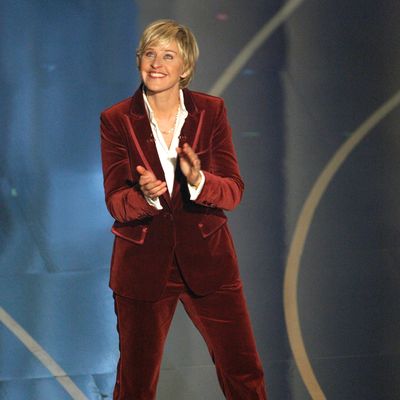
Executing a good Oscar telecast demands the precision and planning of a high-level military maneuver, but when it comes to choosing a host, it often feels like the Academy is picking a general to fight last years war. The recent selection of Ellen DeGeneres as Oscar emcee felt like a balm for the misogyny we got from last years host, Seth MacFarlane  who was himself a youth-skewing corrective for the prior host, Billy Crystal. But is the Academys obsession with overreacting to last years mistakes just a distraction from what really ails the Oscars? Instead of pinning all its hopes on a new host to lead the way, maybe the Academy should start fixing the situation thats right under its nose: The Oscar telecast has been an unwieldy mess for years, and some tough decisions need to be made to prune it.
Now, donÔÇÖt get me wrong: A good host is essential to a good Oscarcast, and you canÔÇÖt have one without the other. In an awards season era where most of the wins feel long-ordained and the acceptance speeches well-practiced, the Oscar hostÔÇÖs monologue is often the only thing that rescues the night from the day-after doldrums: You may not have much to say about so-and-so steamrolling his way to a perfectly expected Academy Award, but youÔÇÖll be talking about Seth MacFarlaneÔÇÖs monologue, Hugh JackmanÔÇÖs musical number, or James FrancoÔÇÖs Oscar-night boredom for years to come.
But after the monologue is put to bed, the Oscar host virtually vanishes from the broadcast, turning up for maybe a few minutes more of those three-plus hours to introduce another presenter or appear in one more brief comedy bit. So after the excitement of that first half-hour fades away ÔÇö and after both of the Supporting Actor and Actress awards have been given out early on ÔÇö youÔÇÖve got that long, deadly middle slog to get through before finally arriving at the final quartet of big prizes in the last forty-five minutes. In picking DeGeneres, the Academy chose a host whoÔÇÖs actually at her best in the middle distance (DeGeneres had a perfectly forgettable Oscar monologue in 2007, but her interstitial bits with Martin Scorsese and Clint Eastwood were gold), but thereÔÇÖs still only so much a host can do on her own when the Academy itself does so little to truncate the telecast to an acceptable length.
What can the Academy change to tighten up that middle stretch where the host ÔÇö and much of the audience ÔÇö seems to disappear? For one, the Oscars can nix the two prizes that matter least to the audience: Best Live Action Short Film and Best Documentary Short. Both categories are the obsolete holdover of a moviegoing era where shorts actually preceded feature-length films in theaters; now, only animated films are likely to present shorts to a wide audience, and even those donÔÇÖt produce enough gems to supply a full category. To qualify for these categories in the YouTube era, you need to rent out a theater specifically to play your short film, and when it all comes down to that sort of head-scratching expenditure ÔÇö which disqualifies countless better shorts that turn up at film festivals or on the internet ÔÇö it should be apparent that the Oscarcast no longer has any need for these two prizes. Cut them.
If the Academy had real balls, they would then cut two more categories that bog down the telecast with little to show for it: Best Sound Editing and Best Sound Mixing. Does it make any sense that the Academy rejects awards for casting directors or stunt performers and yet devotes two of its prime time Oscars to the sound branch? The Academy doesnÔÇÖt even do a good job of differentiating between the two awards: Ask 99 percent of the audience what the difference is between Sound Editing and Sound Mixing, and youÔÇÖll be met by blank stares. If the Academy canÔÇÖt convey those concepts to the audience after decades of trying, then why do they continue to hand out those Oscars during the main show? Even a tie last year in the Sound Editing category couldnÔÇÖt produce a memorable moment to boost the Oscarcast; better to ship these two awards to the OscarsÔÇÖ untelevised awards show devoted to technical winners, where they belong.
Would the Academy ever do such a thing? I canÔÇÖt fathom why they keep the short categories on board, but itÔÇÖs clear why they cower from eliminating the sound categories: Those contests provide two more nominations ÔÇö and potential wins ÔÇö for a studio to add to its eventual tally. Acclaimed as it was, Zero Dark Thirty would have gone home empty-handed this past year were it not for that Sound Editing tie. Life of Pi had the second-highest number of nominations with eleven; without those Sound categories, it would have had only nine. You can bet that if the Academy even hinted that the Sound categories might go kaput, the studio push back would be vociferous.
And so, we get a distraction: The host is always the controversial conversation-starter, while the problems endemic in the Oscar broadcast go unsolved. CanÔÇÖt the Academy use some of that emcee-selecting moxie to take a judicious axe to its own telecast? This is an industry where final cut is handed out rarely; instead, a movie arrives at its running time after plenty of conversation ÔÇö and compromise ÔÇö between the filmmaker and studio. LetÔÇÖs hope that the Academy can take a cue from that battle between art and commerce and come up with a few judicious, long-past-due cuts of its own.

